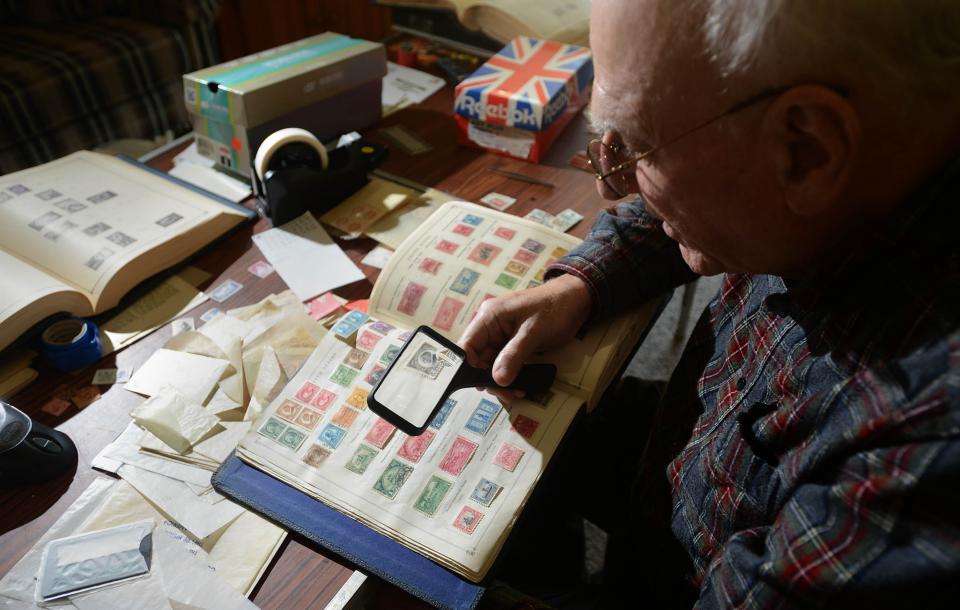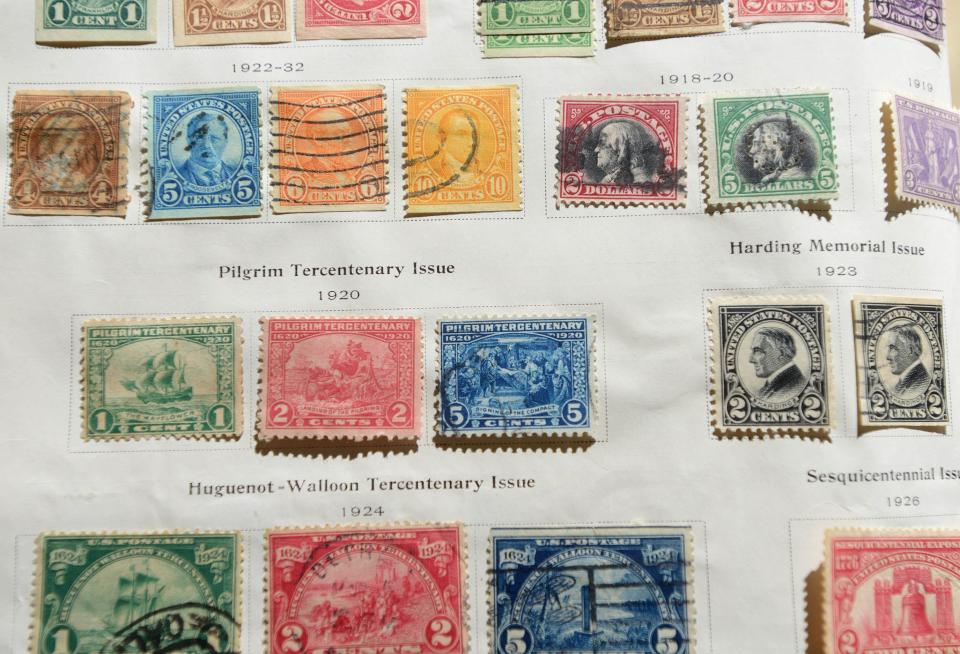Wondering what to do with a stamp or stamp collection? On Cape Cod there are a few options
Stamp collectors have a love of history, a love of learning and an eye for a good investment.
In fact, on Cape Cod, the last remaining stamp club — Cape Cod Area Philatelic Group — would like to help anyone with an old stamp or stamp collection figure out what they have.
“Our mantra is we want to find the stamps a home. It’s history,” club member Peter Bono of Yarmouth Port said in a recent interview.
Philatelic means the members are not simply stamp collectors but are interested also in the postal history, geography or art connected with it, and their collections can cover a wide range of topics, club member David DuBois, who lives in Falmouth, said.

The club, started in 2001, and the last of several that once existed on the Cape. The club meets monthly. Members also attend regional and national stamp shows, other area clubs and are continually buying, selling and trading stamps. The group can be contacted at http://www.sefsc.org/cape-cod.html.
People who like to put things in order are attracted to stamp collecting, said collector Peter Bono of Yarmouth Port.
“I learned geography, world capitals, the early British colonies,” Bono, former president of the Cape group and current secretary, said at his home in Yarmouth Port surrounded by stamp albums.
Like many others, he started collecting as a kid. On his 10th birthday he cashed in a $25 savings bond to buy an envelope of 10,000 worldwide stamps, which he and his mother sorted into countries.
“I kept with it, but it was not a major focus of my life,” he said.
He earned a doctorate in computer science at the University of Michigan.
“People who like to put things in order,” are attracted to stamp collecting, Bono said.
Bono expanded one International Junior Album that covers what is considered the “Classic Era of Philately” from 1840 to 1940 into four albums that he meticulously organized and mounted, now with 27,000 of the possible 35,000 stamps.
He combined stamps with his other main interest in birds during college and studied up on species in different countries. After he retired in 2005, he focused more on the bird stamps and made a loose-leaf binder for every bird family. That collection has grown from 2,000 to almost 10,000 bird stamps. There are 3,500 bird species on stamps, he said.
“Stamp collectors have to make a decision about their reasons for collecting,” Bono said. “They can either buy stamps for investment or simply enjoy the history of stamps.”

Stamp collecting is an opportunity to learn, said Quincy resident Lou Giorgetti, who belongs to the Cape Cod club.
Current Cape club president Lou Giorgetti of Quincy said most collectors do it as a hobby.
“The beauty of this hobby is that no two do the same thing. You can go in any direction,” he said.
Giorgetti, whose focus now is collecting first day covers of Vatican City, said he uses collecting as an opportunity to learn. First day covers are envelopes or postcards with stamps issued by the postal service with the first-day cancellation, and are now often used to commemorate an important event.
More: Stamp of approval
One stamp collector in Falmouth studies submersible Alvin dive covers.
DuBois, who works at Woods Hole Oceanographic Institution, collects and studies submersible Alvin dive covers, the souvenir envelopes that have been carried down in the submarine, had the dive details filled out, and signed by the dive participants.
“It makes you feel like you were there,” he said.
Stamp collecting can become an expensive hobby, especially buying one stamp at a time, Bono said. He recommends buying in lots at auctions, stamp shows or buying a whole album.
“I try to keep the cost to 10 cents a stamp,” he said, but once he got to 50% of a collection, he was more selective, so he started buying on eBay.
Buying and selling on eBay became “a matter of survival,” during the pandemic when there were no live shows, Giorgetti said.
“It’s such an evolution now,” he said. With millions of stamps on eBay, “It’s the way to go.”
Currently there is one stamp store on the Cape, Falmouth Stamp and Coin, and one Cape club member sells stamps at Harwich Antique Center in West Harwich.
More: Fans campaign to get artist Edward Gorey on a postage stamp to mark 100th birthday
Here's what the club does with donated stamps.
At the monthly meetings of the Cape Cod group, members will evaluate, and if they find stamps of high value - as in thousands of dollars - they will recommend going to a dealer.
Condition is the main thing to look for in stamps.
“If it’s in the attic, it’s probably not worth much,” Giorgetti said. Most mint and used U.S. stamps after 1930 are only worth face value or less.
If someone donates a collection to the club, members will sell or raffle the stamps among themselves. Last year, they donated money raised to youth programs at Spellman Museum of Stamps and Postal History in Weston and the American Philatelic Society.
“We hope these efforts support the growth of the hobby by stimulating youngsters to get involved,” Giorgetti said.
Individuals can also donate stamp collections directly to Spellman.
For lesser value stamps, perhaps in the hundreds of dollars, Hugh Daugherty, a founding club member from Orleans, will evaluate the stamps and decide if they can be put on his auction that he runs several times a year.
Gain access to premium Cape Cod Times content by subscribing.
This article originally appeared on Cape Cod Times: Stamp collections reflect love of history, learning, orderliness

